Just sending the baby to kindergarten, parents every day face new challenges. One of them often becomes the refusal of the child from kindergarten food. To understand why he doesn’t eat anything in the kindergarten, you need to look at the new situation with his eyes: what does he think is going on in his head? Let's try to determine the causes of unwillingness to eat and find out what the way out may be.
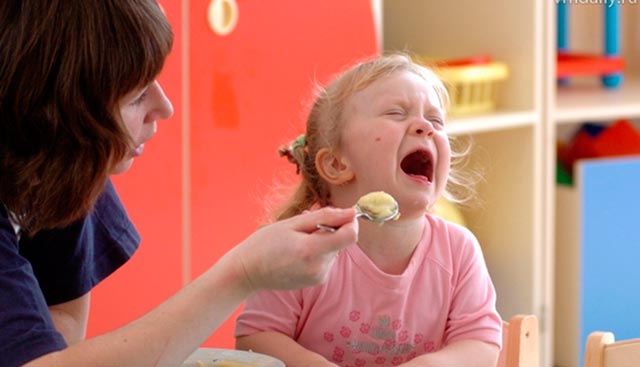
Sometimes a kindergarten teacher gives parents the news that their child is not eating anything. Most often it happens in the adaptation periodthat even more excites the already bewildered parents. Let's try to figure out why the baby can refuse kindergarten food, and what to do if you encounter this.
Common reasons
All the children who have just started attending kindergarten are different. They differ in age and degree of speech, mental development, and even in temperament. Some babies can already go to the toilet, change clothes and eat without assistance, while others have not yet learned to develop self-care skills (4 useful skills in front of a kindergarten) All children have different parents, each of whom brings up his child in a special way. All this affects the severity and length of the period of getting used to kindergarten, during which your beloved child can refuse to eat. Educational psychologists distinguish three groups of causes of this problem:
- Physiological (within the norm) adaptation of the baby to the kindergarten.
- Errors on the part of parents or caregivers.
- Severe adaptation (outside the norm).
In kindergartens there is a scheme developed and supported by educators for the gradual addiction of the baby to the group. First, the child is left in the group for 2-3 hours, and each day the time spent is increased. Most children stay in the garden for the whole day already for 3-10 days.
It seems to us that this time is enough for adaptation. But in reality, many parents are faced with a change in the behavior of the baby. This can be unreasonable (according to adults) whims, anxious sleep, interrupted by frequent awakenings and heart-rending crying, tantrums. The situation is exacerbated by colds that have not been bothered so often before. And now the teacher, accompanying the child to the locker room, says that your child does not eat in kindergarten. What to do? We will tell you how to solve this problem correctly.
How does your baby perceive kindergarten
Children who first went to the garden have not yet learned how to formulate their feelings and thoughts. We will try to do it for them. And the options that kids can think about kindergarten, a lot. Here are some of them:
1. I came to the kindergarten just to play! The parents themselves are usually to blame for the formation of such an attitude to the garden. They drag out the adaptation period, wanting to make it as painless as possible. But everything turns out differently. First, mothers bring their children after a hearty home-made breakfast directly to the kindergarten playground. And from there they take them home after a couple of hours, where they give a good lunch. The child has the idea that "kindergarten is a place for fun games." In the future, he refuses the proposed food, not even going to the dining table.
2. I was woken up, and I want to sleep. I don’t want to eat! All children need daytime sleep. And in the garden after it a snack is laid. But if the child is not accustomed to such a daily routine, then he will refuse to eat after sleep. Mom can create a similar regime even at home.
3. I won’t eat porridge because I ate delicious food at home. And I have sweets in my pocket. Moms do not want the baby to starve to death in kindergarten while waiting for breakfast. Therefore, in the morning he is fed at home, and even worse - they give him a little sweet to "kill the worm." After a light bite, the child will refuse breakfast, and then he will have to listen to a hungry rumbling in his stomach until lunch.
4. I will not eat to have time to play all the toys. And there are so many of them! Usually this is what children who visit the garden just a few days think. Studying the new environment and the abundance of unfamiliar toys rob them all the time. Is it here before the meal?
5. I don’t want to eat right now. Maybe I want it in two minutes, or maybe ... then in another ten ... So argue children who have formed a bad habit of snacking on the go. If they refuse to eat dinner at home, their parents still will not leave them hungry: they will give something to eat in the middle of the game. Why eat at once everything that is served if an apple, cookie or a glass of juice appears on demand?
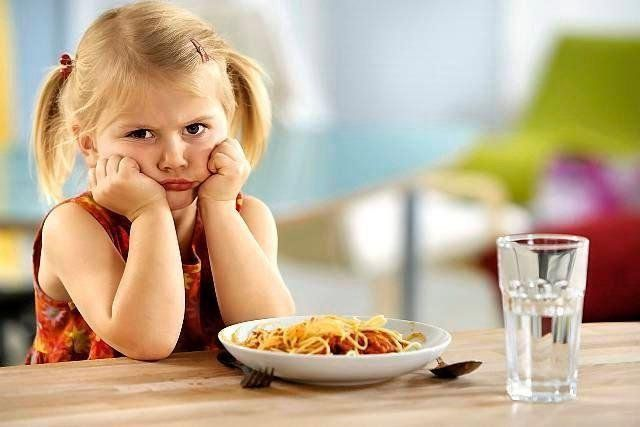
6. I am very tired. Getting used to the new order takes away a lot of energy from the child. Here choleric and phlegmatic suffers equally. The first ones have to restrain themselves, because the teacher is not a mother - you can’t play at home. And the second ones have to hurry themselves to keep up with all. In just a few hours, the baby’s strength disappears, and already at the dinner table he will be barely picking his spoon in a bowl of soup, remembering how he felt good at home with his mother. But there is a worse option: your child will cry or just fall asleep at dinner instead of eating. The hardest thing is for children who go to bed late: they have to hurry out of a warm bed and go not rested to the garden.
7. Mom left me forever! Yes, mom repeated several times to her child that she would return. But the baby still broke up with her forever. It is normal that he thinks so: this is the peculiarity of the psyche of children 2-3 years old. After such grief, the appetite disappears. The child needs time to get used to the fact that parents leave and come. Much also depends on his ability to understand adult speech, communicate and trust. Psychologists advise to accustom the child not to be afraid of leaving mom or dad. To do this, for some time, children should be left with grandmothers, other relatives or friends.
8. I will only obey my mother, not this aunt. The kid needs help learning that the teacher is not an outsider. She needs to be trusted, much less obeyed. If the child does not understand this with the help of his parents, then it will be harder for him, because he will have to get to this by studying the behavior of other children. And until he begins to obey, feeding him in the garden will not be easy.
9. The aunt who makes me eat is very angry. I'm already sick of fear. There is no reason to be "offended" by educators who do not force the kids to eat up everything during the adaptation period. He didn’t finish it, but he didn’t vomit. In a few days, the appetite will come, but getting rid of the usual vomiting would be more difficult.
10. If I don’t eat, my aunt will call my mother, and she will immediately take me home. This happens often.Mom has not yet left maternity leave for work, and so far it is not difficult for her to take her baby home for lunch to feed her. But children quickly get used to the good ...
11. I won’t eat, so that the yummy that my mother will give me got in. Remember the first thoughts that visited you after the teacher said that the baby does not eat at all in kindergarten. Of course, you decided to feed him all day! And it’s necessary only with his favorite dishes, because he is so hungry! What will happen then? ... Children get used to good things so quickly ... What should I do? Instead of going to eat right away, take a walk on the street for at least an hour. The child will ask you to eat, to which you will be surprised to say: “Have you not eaten delicious food in the kindergarten? Ay-ah-ah ... I wanted to go with you to the park after the garden tomorrow. If you want to ride there, do not forget to eat well before that. ”
12. At home I sit in a high chair and at a large table! Yes, home is always better than away. And not only for children. It will pass by itself.
13. This is not my favorite plate, the spoon is also uncomfortable ... And all the kids get used to it quickly.
14. I don’t want to drink from a mug, I need my drinker (or worse - a bottle)! It will be easier for you and the child if you stop giving the pacifier in time and teach the baby use dishes "for adults".
15. It is very interesting what is in the plate of others? And what do they have in their pockets? Curiosity for children is a good quality that helps harmoniously develop their psyche. But it really makes it difficult to eat calmly. We'll have to wait for the baby to grow up, and his curiosity will become more moderate. In the meantime, the teacher will “tame” the especially curious.
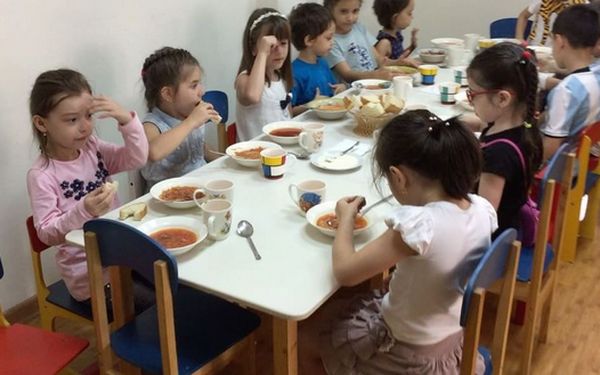
16. Won't they feed me themselves? Everyone loves to be lazy, even those who knows how to use a spoon. But you still need to check: maybe if you refuse to eat on your own, then the aunt will feed herself? After all, it works well with mom.
17. I won’t eat without cartoons! How is no TV? Well, tell a fairy tale or something ... Yes, even the educators themselves use game elements when eating: “we’ll see who first eats the whole soup today”, or “eat another spoon for Mom”, or “the one whose first cup is empty will water the flowers”. But a measure is needed. Moreover, cartoons during lunch prevent children from chewing food qualitatively, while less digestive juices are released. All this increases the risk of indigestion.
18. What is it? This is not at all what mom feeds me! Yes, you can’t argue with that. But the kindergarten menu was developed by specialists, taking into account the needs of kids of this age. They give only wholesome food that strengthens and maintains health, not fried potatoes. But there is a way. If the mother at home will include kindergarten dishes in the child’s diet, the adaptation period will be easier. You can get acquainted with the technology of their preparation in the same kindergarten.
19. I have little salt! And sugar too. I do not eat onions and carrots. Casserole too! I will never eat it. Excessive selectivity of the child in food is usually associated with a lack of education. Remember that children in everything copy parents. And is your household eating everything? Remember, your phrases must have sounded at home: “it’s not ready, it’s not tasty”, “I will eat it only with ketchup”, “do not put greens, it’s only for rabbits”, “phew ... remove the froth from the milk”. You can finish the list of phrases yourself. It is very difficult to explain to the mother who loves the baby that he need to give healthy food, to be healthy. And if milk is healthy, then it should be drunk. But how to teach him to drink, if none of the parents does this? It is enough to drink a glass of milk with a sincere smile so that your child dares to do the same. There is no need to twist in disgust, because it is so easy - just smile at the fact that you are drinking milk.
20. How cool my mother told her aunt manager that the cooks are poorly prepared and do not give me lemonade with sausage, and the teacher does not feed me from the spoon! Since mom scolded her, then I'm right that I don’t eat puddings, soufflés, or salads.But at home, mom will complain to dad, and then he will show the whole garden! The idea of a kindergarten in a child is formed on the basis of the attitude of his parents to him. Everything that adults say is heard by the children, even if something was said in a whisper. After all, they always have “ears on the top”. Therefore, it is not worthwhile to discuss kindergarten workers, and even more so, to conflict with them with children. Otherwise, the child will copy the behavior and there will be no more in the group. After all, he cannot trust a person whom his mother does not trust. What if she’s also offended because he listened to the teacher? What to do? If you don’t give praise, as is the case with a cup of milk, then at least not speaking about the kindergarten and their employees is bad in the presence of your child. And all discontent can be expressed personally or at the parent meeting.
Dear parents, did you find from this list thoughts that are similar to what your child thinks? If so, then congratulations! You hear your child and want him to be happy and healthy. We hope that you will understand what you could be wrong in, and now it will be easier for you to cope with the problem. And if the adaptation to the kindergarten is delayed or too difficult, you are grateful to accept the help of a psychologist and a kindergarten methodologist. Everything will be alright!
We also read:
- The child does not eat in kindergarten: why and what to do (part 2)
- Adaptation of the child to kindergarten: what parents need to know
- Mistakes of parents, because of which the child does not want to go to kindergarten
- What a child should be able to do in front of a kindergarten - 4 useful skills
- 7 skills that a child must learn before kindergarten
- How to wake a child in the morning in kindergarten without tears and vagaries



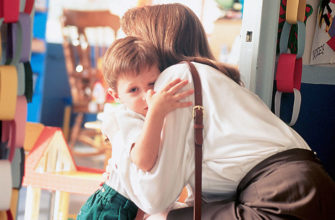




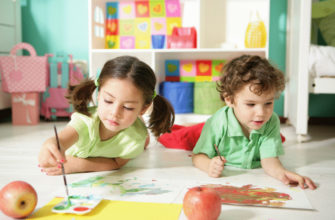
This problem is relevant at all times. Fortunately, there is no such problem with my son. There are several dishes that he doesn’t eat at home, and you won’t make them in the kindergarten. I think it all depends on the teachers. Remember the film Geltelmen of Fortune.
My daughter also ate in the garden every other time, explained that she did not like food. I cheated, said that I would pass her food to the kindergarten, but the same as that of other children, I began to eat. I thought that mom gives the cooks)